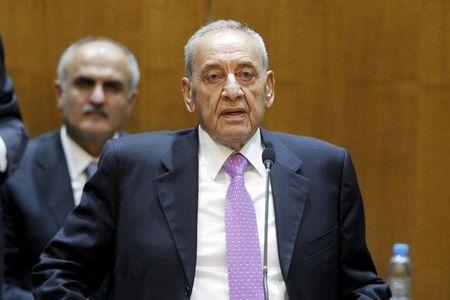
BEIRUT (Reuters) – Lebanon’s parliament speaker called for an understanding between two Christian politicians over the presidency that has been vacant for 18 months, saying continued political deadlock was only serving terrorism.
The call by Nabih Berri, one of Lebanon’s most powerful politicians, was directed at Christian leaders Michel Aoun and Suleiman Franjieh, who were due to meet on Wednesday and expected to discuss the presidential crisis.
Franjieh, a friend and ally of Syrian President Bashar al-Assad, has been proposed as president in a power-sharing deal tabled by Saad al-Hariri, a Sunni Muslim politician backed by Saudi Arabia.
But Franjieh requires Aoun’s blessing for the deal to proceed. Aoun, who himself wants the presidency, is seen as vital to the success of any deal due to the support his candidacy enjoys from powerful Shi’ite Muslim group Hezbollah, which is backed by Iran.
"The best scenario in this regard is an understanding between Michel Aoun and Suleiman Franjieh," a statement from Berri’s office said. Berri heads the Shi’ite Amal movement and is a close ally of Hezbollah.
"…The continuation of the situation as it is, and not strengthening consensus, benefits terrorism that is ambushing all of us," the statement said. "Solving our crises "would allow us more power to confront this enemy."
Lebanon has been rocked by security incidents since the eruption of the war in neighboring Syria. Most recently, Islamic State suicide bombers killed more than 40 people in an attack in the southern suburbs of Beirut last month.
Hariri would become prime minister under the power-sharing agreement he has proposed, the most serious effort yet to resolve a governing crisis that has been exacerbated by region-wide armed conflict.
The prospects of a deal seemed good last week when both Iran and Saudi Arabia, regional powers that are in conflict across the Middle East, expressed their support for a settlement in Lebanon. Both wield influence over rival Lebanese factions.
But former president Amin Gemayel said on Tuesday there were no "ready solutions" to the crisis after he met Aoun, who has headed the biggest Christian bloc in parliament since 2009 – the last time Lebanon held a parliamentary election.
(Writing by Sylvia Westall/Tom Perry; Editing by Mark Heinrich



